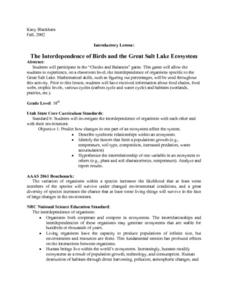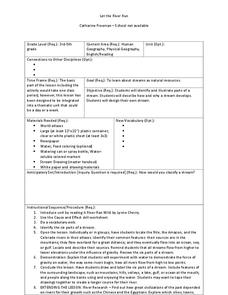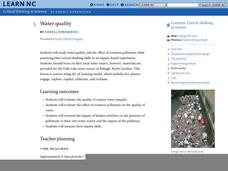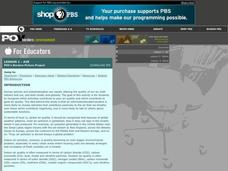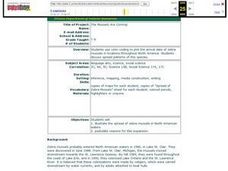Curated OER
The Interdependence of Birds and the Great Salt Lake Ecosystem
Tenth graders participate in the "Checks and Balances" game. This game lets them experience the interdependence of oragnisms specific to the Great Salt Lake. They recieved informaton about food chains, food webs, trophic levels various...
Science 4 Inquiry
An Investigative Look at Florida's Sinkholes
In May of 1981, the Winter Park Sinkhole in Florida first appeared and is now referred to as Lake Rose. Scholars learn about the causes of sinkholes through an inquiry project. Then, they analyze recent data and draw conclusions to...
Curated OER
Exploring The Great Salt Lake
Second graders experiment with sand samples taken from a lake. They use this as part of an inquiry that is based on observations. The properties of the sand are observed in the lab and recorded in writing. Prior to the lab students...
Curated OER
Water Properties of the Great Salt Lake
Fourth graders examine the ecosystem of the Great Salt Lake in this two-part lesson, completing a KWL chart before and after the field trip to the site. While there, they draw and write about their observations. To test for buoyancy,...
Curated OER
The Great Water Hunt
Students examine a globe to locate the bodies of water present and create a representation of those bodies of water for further exploration of the concept. Extensions of their observations are made at school, home, and the community.
Curated OER
Invasive Species
Eighth graders explain the impact of exotic species to an ecosystem. In this environmental science lesson, 8th graders brainstorm ways to eliminate invasive species. They share their ideas in class.
Michigan Sea Grant
Fish Habitat and Humans
Strict habitat requirements are needed for the survival of fish populations and fish variety in the Great Lakes. Young scientists become experts in the basic needs of fish and understand how survival necessities can vary with different...
Curated OER
Let the River Run
Students explore the environment by reading a story in class. In this water formation instructional activity, students define environmental terms such as rivers, streams, gulf, oceans and lakes. Students read the story A River Ran Wild...
Curated OER
"Eggs-perimenting" Fun
Young scholars dissolve salt into water, place an egg into a glass of salt water, observe and record observations, make a scientific hypothesis, summarize what they studied from this hands-on experiment. They share their ideas and...
Curated OER
How Big is a Crowd?
Sixth graders compare the relative sizes of the five Great Lakes and their human populations. They describe some of the problems that arise when many people depend on a limited resoure. Students discuss how the Great Lakes and the...
Curated OER
Water Quality
In this unit of lessons, students examine the quality of water. They create poems and make observations about the quality of water. They also examine hot spots and the quality of water in the Great Lakes.
Curated OER
Lake and Pond Study
Students examine the habitat and community structure of a pond that could support Ospreys through games and worksheets. They then go on a field trip to a pond to evaluate the suitability of the pond as an Osprey habitat.
American Physiological Society
Drug the Water Flea
This is a flea. This is a flea on drugs. Any questions? Your class will have questions aplenty during an impactful experiment. Lab groups get to know Daphnia magna, the humble water flea, and study the effects of stimulants and...
Curated OER
Parts of an Ecosystem
Fourth graders study the Great Salt lake and the ecosystem that encompasses it. They study the relationship between an individual of a species, a population of that species, a community that includes that population, and the...
Michigan Sea Grant
Exploring Watersheds
Collaboratively, students partake in a hands-on activity in which they build models of a watershed. Each group member draws an elevation map—a bird's eye view—of their model and predicts how water will flow from the high to low points....
Curated OER
Effects of the Southern Pacific Railroad Causeway
Fifth graders describe the appearance of a substance before and after a physical change. They re-create the Southern Pacific Railroad Causeway across the Great Salt Lake. They determine for themselves how the water is exchanged...
Curated OER
A Funny Taste
Students participate in a demonstration that illustrates the relative amounts of salt in various bodies of water including the Dead Sea, Sallt Lake, Ocean water and distilled water. They taste and compare various mixtures.
Curated OER
Discovering the Oasis
Students focus on the types of vegetation and animal life living around local water sources. This lesson can be adapted to any local water source, whether it be a lake, a river, stream or ocean. It has a particular focus on the bird...
Curated OER
P.O.V.'s Borders Picture Project: Lesson 1 - Air
Take photos of human activities that impact air quality. Collaborative groups present one of the photographs, identifying how the activity contributes to air quality and what can be done to minimize the impact. As one in a series of...
Curated OER
Discovering Water
Students examine how to conserve water. In this water conservation lesson students complete a water watching lab activity.
Curated OER
The Mussels Are Coming
Students work together to identify and describe the various types of mussels. Using a color-coded system, they plot the arrival date of zebra mussels in North American waters. They discuss the increase in their population with the class.
Curated OER
Aquatic Exotics
Students identify and describe the aquatic exotic species found in Illinois. Using the internet, they research the species origins and discover their effects on native species in the area. They discuss how appropriate it is to introduce...
Curated OER
Biological Control of Purple Loosestrife
Students examine the role of Purple Loosestrife in Illinois and Indiana rivers. In groups, they collect a wide variety of plants in a wetland and raise beetles in a controlled environment. They introduce the loosestrife into the...
Curated OER
Where Do All the Toxins Go?
Students demonstrate how chemicals accumulate in fish fat. They study path ways of toxins in the fish's body and ways to prepare fish to avoid consuming the toxins. They examine U.S. and Canada regulations to protect the environment.
Other popular searches
- Great Lakes Worksheet
- Great Lakes Biodiversity
- Great Lakes Map
- Label the Great Lakes
- Maps of Great Lakes
- The Great Lakes
- Michigan's Great Lakes
- Five Great Lakes
- Great Lakes Region
- Great Lakes Lesson Plans
- Traveling the Great Lakes
- Activities the Great Lakes


